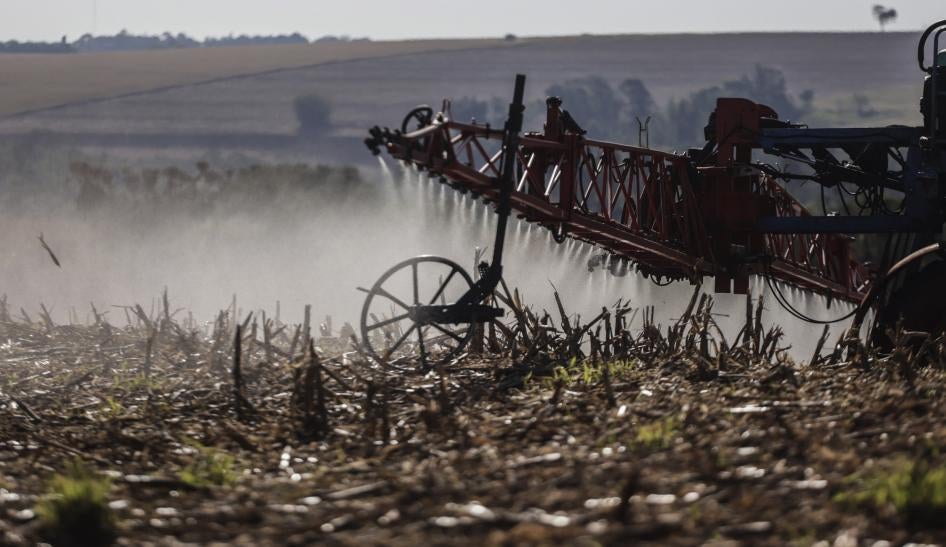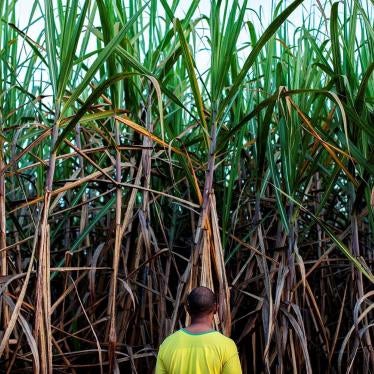(São Paulo) – President Luiz Inácio Lula da Silva should veto a bill set to weaken regulations on the registration and authorization of pesticides in Brazil, Human Rights Watch said today. Bill 1459/2022, passed by the Senate in a rushed procedure on November 28, 2023, presents a serious threat to the environment and the right to health.
The bill, which rights and environmental groups call “the poison package,” would substantially reduce the role of both the health and environment agencies in determining which pesticides can be used in Brazil and would instead grant the Agriculture Ministry primary authority. It would also create a new timeline that fast-tracks pesticide registration and allows for temporary approvals before a pesticide’s risks are thoroughly reviewed.
“Brazilians have a right to safe food, clean water, and clear air,” said Maria Laura Canineu, Brazil director at Human Rights Watch. “Instead of opening the floodgates for dangerous pesticides, President Lula should veto the bill and improve regulations to protect Brazilians’ lives and the environment.”
The Senate approved the bill following review by the Senate Environmental Commission and a request by Senator Tereza Cristina to urgently expedite the vote, skipping review by other thematic commissions. United Nations experts had repeatedly called on the senate to reject the bill, warning that its adoption would “mark a monumental setback for human rights in the country.” Though the bill has since been updated, many of the serious concerns raised by experts remain. A separate bill proposed by civil society organizations to establish a National Policy for Pesticide Reduction has been pending since 2016.
Brazil already imports more pesticides than any other country. Nearly half are classified as “highly hazardous” by the Pesticide Action Network, an international advocacy organization, meaning that they “are acknowledged to present particularly high levels of acute or chronic hazards to health or environment” under international classification systems. Health risks of certain pesticides include cancer, hormonal conditions, infertility, miscarriage, negative impacts on fetal development, neurological diseases, and death.
Despite these risks, the proposed bill removes existing prohibitions on the registration of pesticides that are associated with cancer, endocrine disruption, genetic mutation, or harm to the reproductive system and replaces these important health protections with a vague prohibition on pesticides with “unacceptable risk.” The health and environmental agencies would be responsible for analyzing and approving the technical opinion on health and environmental risks provided by the applicant for registration. However, according to the proposed bill, the ultimate decision whether to issue registration and authorization of pesticides would rest with the Agriculture Ministry. It is unclear to what extent the Agriculture Ministry would need to consider the assessments of the health and environment ministries.
The “poison package” was initiated in 1999 by then-Senator Blairo Borges Maggi, nicknamed “the soybean king” from the major soy-producing state of Mato Grosso. Maggi is part of the family that owns the Ammagi Group, one of the world’s biggest soybean producers. Almost half of the pesticides imported to Brazil are used in soy production.
Nearly half of the European Union’s soy imports originated from Brazil in 2022, amounting to more than 150 million kilograms. Mato Grosso alone accounts for a fifth of all Brazilian soy exports to the EU.
Experts have warned that the new bill will give corporations more power to dictate the use of pesticides in Brazil. UN experts raised concerns that the “overwhelming financial capacity of the agriculture lobby in Brazil would easily control decisions adopted with this new institutional arrangement.” The reduction in oversight over pesticide use also risks potentially undermining the right to access health information.
The bill reduces timelines for the registration of pesticides in Brazil to two years maximum and gives the Agriculture Ministry authority to temporarily approve the use of some pesticides before other regulatory agencies have had the chance to complete their analyses of the risks of the imported product. According to UN experts, these new timelines “clearly privileg[e] the commercial interest of the industry over the protection of the rights of people to health and life.”
The “poison package” weakens even further the already inadequate regulations in place to prohibit or limit the use of highly hazardous pesticides and to protect against harmful exposure. In 2018, Human Rights Watch found that many people living in rural Brazil were poisoned from pesticides sprayed near their homes, schools, and workplaces. According to data from the Health Ministry’s notification system, on average, a person dies from pesticide poisoning in Brazil every three days. These numbers are most likely a low estimate given barriers to accessing health services in rural areas and a lack of training and limited laboratory coverage to confirm cases.
Regulations on buffer zones for the spraying of pesticides are inadequate and rarely enforced. Instead, Human Rights Watch found that people in many exposed communities fear reprisals from large landowners. Some people told Human Rights Watch that they received threats or were afraid of retaliation if they reported pesticide drift that they believed poisoned them.
Weak regulations affect all Brazilians when hazardous pesticides show up on fruits and vegetables and in the drinking water. Brazil’s national health monitoring agency tested more than 4,600 samples of common produce from supermarkets in nearly every Brazilian state between August 2017 and June 2018 and found that nearly a quarter of samples had dangerous traces of pesticides, including those considered highly hazardous.
For example, the researchers found traces of atrazine in lettuce, which has been banned in the EU since 2003 because it interferes with reproduction and human development and may cause cancer. Atrazine remains one of Brazil’s top pesticides and is used in 5 percent of the country’s pest control products.
Traces of hazardous pesticides show up on Brazil’s exports as well. A 2023 study by Greenpeace Germany found residues of hazardous pesticides on limes exported by Brazil to the EU, including some pesticides banned for use in the EU.
EU countries should raise concerns with President Lula that the “poison package” increases the risk of hazardous pesticides showing up on produce exported from Brazil. The EU Commission should also live up to its 2020 commitment to introduce new measures ensuring that hazardous chemicals banned from use in the EU are not produced for export, including to Brazil, Human Rights Watch said.
The “poison package” threatens the human rights to life, health, and a healthy environment, Human Rights Watch said.
“Brazil is a top producer of the world’s food, and its lax regulations on hazardous pesticides are a global concern,” Canineu said. “Major importers of Brazilian produce in the European Union should press President Luiz Inácio Lula da Silva to veto the “poison package” and chart a path toward a regulatory system centered on health and environmental sustainability.”









